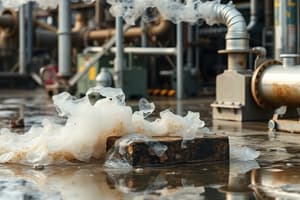Podcast
Questions and Answers
What is the primary focus of environmental chemistry?
What is the primary focus of environmental chemistry?
- Promoting agricultural practices
- Studying the effects of chemical processes on the environment (correct)
- Exploring sustainable living technologies
- Understanding human interactions with the natural world
Which of the following is considered a primary source of pollution?
Which of the following is considered a primary source of pollution?
- Solar energy farms
- Marine protected areas
- Recycling facilities
- Agricultural runoff (correct)
What is a common environmental chemical reaction that plays a crucial role in our planet's ecology?
What is a common environmental chemical reaction that plays a crucial role in our planet's ecology?
- Nuclear fission
- Plastic production
- Photosynthesis (correct)
- Fossil fuel combustion
Which of the following is NOT a negative impact of pollution sources on the environment?
Which of the following is NOT a negative impact of pollution sources on the environment?
What do environmental science and environmental chemistry have in common?
What do environmental science and environmental chemistry have in common?
Which of the following environmental actions can help us live more sustainably?
Which of the following environmental actions can help us live more sustainably?
Which of the following is NOT a key strategy for addressing climate change through sustainable practices?
Which of the following is NOT a key strategy for addressing climate change through sustainable practices?
What is the primary role of environmental science in relation to climate change?
What is the primary role of environmental science in relation to climate change?
Which of the following is NOT a pillar of sustainability?
Which of the following is NOT a pillar of sustainability?
What is the primary goal of sustainable practices in relation to the environment?
What is the primary goal of sustainable practices in relation to the environment?
Which of the following scientific disciplines contributes to understanding the Earth's climate system?
Which of the following scientific disciplines contributes to understanding the Earth's climate system?
What is the primary role of environmental chemistry in relation to the environment?
What is the primary role of environmental chemistry in relation to the environment?
Flashcards are hidden until you start studying
Study Notes
Environmental Science and Environmental Chemistry
Environmental science is the interdisciplinary study of human interactions with the natural world and how technology can help us live more sustainably. On the other hand, environmental chemistry focuses primarily on understanding the effects chemical processes have on the environment. In this context, we will discuss these fields, considering their overlap and the importance of examining both disciplines.
Pollution Sources
Pollution in its simplest definition refers to any foreign substance present in the environment that could cause harm. The primary sources of pollution include agricultural runoff, atmospheric emissions from industrial processes, solid waste disposal, landfills and mining operations, oil spills from petroleum resources and transportation, and wastewater discharges. The negative impact of these sources is not limited to the immediate environment but can have long-term effects such as soil contamination, groundwater pollution, eutrophication of water bodies, and human health risks.
Chemical Reactions in the Environment
Environmental chemistry helps us understand how chemical reactions occur in natural systems and how those processes affect our planet's ecology. Some common environmental chemical reactions include photosynthesis, respiration, decomposition, acid-base reactions, precipitation, and more. These reactions play an essential role in maintaining ecosystems and support life sustaining activities like air exchange and nutrient cycling.
Climate Change Impacts
Climate change is already having significant impacts on our world, with many more expected in the future. Environmental science plays a key role in understanding the causes, consequences, and potential responses to climate change. By studying the Earth's climate system through various scientific disciplines, including atmospheric sciences, oceanography, and geoscience, researchers gain insights into the complex physical and chemical processes that govern our planet's climate. Understanding these processes allows scientists to develop strategies for mitigating and adapting to climate change.
Sustainable Practices
In response to the global challenges posed by industrialization, pollution, and resource overexploitation, sustainable practices have emerged as a critical component in both fields. Sustainability focuses on preserving ecological balance across generations without compromising quality of life. To achieve this goal, sustainability involves three pillars: economic prosperity, social equity, and environmental stewardship. For example, reducing greenhouse gas emissions and using renewable energy sources are key sustainability strategies for addressing climate change. Similarly, reducing pollution sources and promoting eco-friendly practices can help mitigate the negative impacts of industrialization on the environment.
In conclusion, environmental science and environmental chemistry are interconnected fields that provide valuable insights into the complex relationship between human activities and the natural world. Both disciplines are essential for understanding the processes that shape our environment and developing strategies to minimize negative impacts while promoting sustainable practices. By fostering collaboration between professionals in these areas, we can work together towards a more sustainable future.
Studying That Suits You
Use AI to generate personalized quizzes and flashcards to suit your learning preferences.




